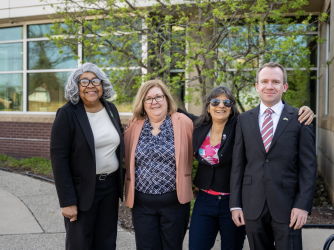Table of Contents
Talking on Eggshells in College

This article appeared in The Huffington Post.
Imagine a hotline that you could call any time to anonymously report your neighbors for perceived slights against you. These slights aren’t crimes. Rather, this hotline is for opinions, jokes, or even gestures that could be seen as an affront to one’s “race, class, gender, sexual orientation, ability and more.”
“Legal action” could potentially follow for the offender, even if you, the accuser, remain anonymous. At minimum, the offending expression is collected in a catalogue of all the other unintentional slights, politically incorrect jokes, drunken confessions and misinterpreted statements that have offended somebody, somewhere.
This might sound like the fictional premise for a dystopian novel, but to the Student Government Association at New York’s Ithaca College, this premise sounds ideal — it’s their plan to root out “microaggressions” on campus. As reported by The Ithaca Voice, microaggressions, deemed to be “papercuts of oppression“ at Princeton University, often come in the form of offhanded comments like “Where are you really from?” and “You speak good English.”
Although the Ithaca College program appears on its face to be a way to track supposed microaggressions on campus, Angela Pradhan, the student sponsoring the resolution, believes it has potential to be more than that. While she tried to reassure one interviewer that not “every instance will require trial or some kind of harsh punishment,” her words imply that some comments would. She describes it as “record-keeping but with impact.”
One of the most concerning aspects of the student government’s resolution is that it was created especially to track the demographics not only of those reporting the microaggressions, but also of the “oppressors.” The goal, according to the resolution, is to create “a safer, more inclusive, and diverse community for all students.” More likely, the result will be a chilling of ordinary personal interaction that stifles intellectual debate, creates a war on candor, and leaves students and faculty talking on metaphorical eggshells.
The Ithaca program is just one extreme example in a long line of “bias-related incident programs” that have existed on campus. Back in 2009, California Polytechnic State University came under fire for a program that similarly allowed for anonymous reports of student and faculty speech deemed “biased” or not “politically correct.” The purpose of the program was to “protect students from biased teachers” and other “biased incidents.” In reality, all it did was violate the Constitution and teach students bad lessons about what it means to live in a pluralistic society with people genuinely different from you. Under pressure from the Foundation for Individual Rights in Education (FIRE), the program was abandoned.
The administrators and students who advocate for these bias-reporting programs seem to be under the impression that campuses are far too permissive and tolerant of provocative speech. If anything, campuses are increasingly places where professors and students alike find themselves having to carefully watch what they say, lest they fall victim to the speech police.
FIRE recently published a study that found that 55 percent of over 430 colleges surveyed maintain policies that would never live up to First Amendment standards. The effect of these restrictive policies and the culture of fear they can create is staggering: A 2010 study showed that only 16.7 percent of polled professors strongly agreed with the statement that “it is safe to hold unpopular positions on campus.” And that study was conducted before the recent renaissance of politically correct censorship that seems so determined to “out-PC” the ‘90s.
Writing in The New York Times this week, Judith Shulevitz lamented the “safe spaces” that colleges increasingly feel they need to create for students to shield them from what she calls “scary ideas.” One student quoted in Shulevitz’s piece said she needed to flee a campus debate on sexual assault because she felt “bombarded by a lot of viewpoints that really go against [her] dearly and closely held beliefs.”
And as liberal commentator Jonathan Chait argued in New York magazine back in January, the politically correct norms that were once oppressive only on campuses have now bled their way into the formerly brave and bold world of social media. After all, what happens on campus doesn’t always stay confined to campus.
The value of policing campus speech rests on some very strange assumptions. Advocates of speech policing seem to think we’d be better off in a society where we only speak in the approved manners of a small subset of those who hold social science PhDs. It treats candor among individuals as a nasty mistake to be trained out of ignorant, non-professional speakers.
Ironically, the policies and programs at schools like Ithaca College that seek to impose strict communicative norms generally don’t have their intended effects. They don’t create a more tolerant campus environment. They don’t change people’s minds. They just end up nudging people toward talking only to those with whom they already agree. As social scientists and writers, including Harvard professor Cass Sunstein, tell us, the more we talk to those with whom we agree, the more we come to see those with whom we disagree as ignorant, evil — or both.
But perhaps most dangerously of all, speech policing advocates forget that there is incredible value in knowing what people actually think, unfiltered. Believing you can conquer racism, bias and bigotry by rooting out microaggressions and enforcing self-censorship and uptightness is like taking Xanax for syphilis — sure, you’ll feel a little better in the short run, but your disease will continue to take its toll.
Teaching students the discipline necessary to enjoy the benefits of pluralism is something our colleges should do, but as it currently stands, they seem to teach a generation how to fear freedom of speech — with no thought to the unintended consequences.
Recent Articles
FIRE’s award-winning Newsdesk covers the free speech news you need to stay informed.

USC canceling valedictorian’s commencement speech looks like calculated censorship

Back into the FIRE: Hasen’s response to FIRE and Rohde: Don’t read the press clause out of the Constitution — First Amendment News 420

VICTORY: Michigan town declares Sept. 6 ‘First Amendment Day’ after FIRE sues its mayor for shouting down residents
